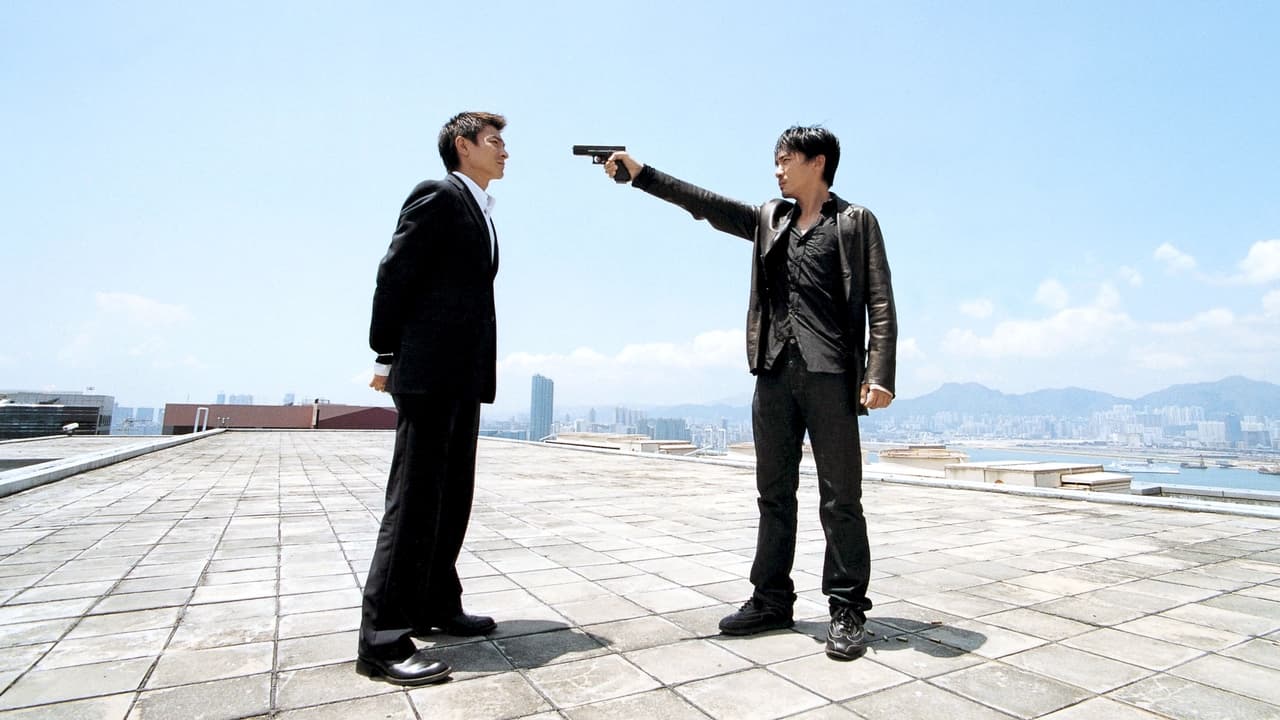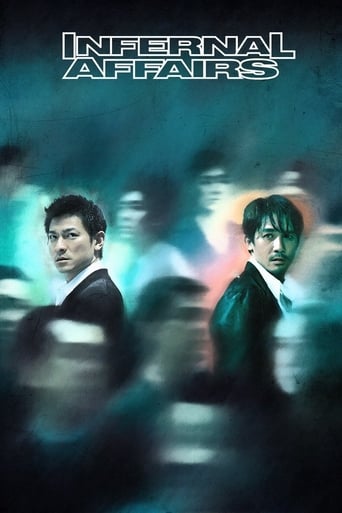

Greetings from Lithuania.Because "The Departed" (2006) is basically one of my favorite movies of 21st century, i kinda wanted to see one day "Infernal Affairs" (2002) - a movie based on which "The Departed" was made. Seen it only now for the first time i was kinda shocked - "The Departed" isn't just a movie based on this one - basically its a copy/paste movie. Sure directing was better and production values, even acting in a USA movie, but boy oh boy did i was surprised of great "Infernal Affairs" really is. As the one who saw "The Departed" like 4 or 5 times in my life, story wasn't anything new one, so to say. The ending was different, but i lived both endings.Overall, its impossible to speak about "Infernal Affairs" without mentioning its Hollywood's remake. Both movies are great in their own terms. Maybe in original movie they overplayed with some scenes which kinda looked a bit cheeze and not so "in your face" style like in Martin Scorsese movie, but overall you should definitely see "Infernal Affairs" even if you have seen it USA version. Its a great movie.
... View MoreInfernal Affairs focuses on a police officer named Chen Wing-yan, who goes undercover into a triad, and a triad member Lau Kin-ming, who infiltrates the Hong Kong Police Force. Each mole has been planted by the rival organisation to gain an advantage in intelligence over the other side. The more the moles become involved in their undercover lives, the more issues they have to cope with.The prologue opens with the introduction of triad boss Hon Sam, who sends a number of young gangsters to the police academy as moles, among whom include a young Lau. Concurrently, a young Chen joins the police force but is seemingly expelled from the academy even though he manages to impress Superintendent Wong Chi-shing. In reality, Chen has become an undercover agent reporting only to Wong. Over the course of ten years, Chen experiences great stress from his undercover work while Lau quickly rises through the ranks in the police department. The film begins with a meeting between Chen and Lau in a hi-fi store without either of them knowing the other's identity.
... View MoreI know I'm against the common opinions here, however, despite I found the movie intriguing with a engaging plot, I found it really not too exciting and thrilling because a few problems.The most important part of a movie is without doubts the plot and this one has a great one. That said, some parallel stories have no depth and aren't developed at all. But mostly and especially seem there was not a exactly striking edit and a flawless execution. A very good thriller, but the current rating, despite its undoubted merits, being too high, could let someone, slight disappointed.7/10
... View MoreAndy Lau and Tony Leung are two giants in Asian cinema and they play opposites in this cop thriller which pits two moles against each other in a complex hierarchy of modern Hong Kong. They are extremely prolific actors because they are capable, which is disappointing because the direction doesn't always allow for them to emote and fully display the gravity of their situation. When Superintendent Wong's lifeless body hurtles down onto the streets, the score instantly turns sentimental and we are treated to black and white flashbacks of their previous scenes, of that connection to Chan's old life instantly severed. But we must be emotionally manipulated into feeling this. When Lau's girlfriend discusses her novel's main character's morality, the score again turns from the tense percussion of the earlier scenes to this soft sentimental piano piece. Her description of this character who is supposedly a good person but who does bad things is so painfully unsubtle that it takes away from this great script. There's an early scene that allows Lau and Leung to display their talent, one that is not in Scorsese's Departed. A simple occurrence of a man buying a stereo allows us to roughly gauge what sort of person Chan is, before revealing he in fact works for the mob. And that stereo of course returns with significantly more important implications. Many of the segments of the script were directly lifted for Departed, and that is an indication of their importance, and their effectiveness. The thematic narrative is just as effective in dreary and gritty Hong Kong as it is in the Irish Catholic underbelly of Boston. There's the drug deal that is monitored from both sides, the respective moles relaying information that is delicately balanced and edited. It's a tense scene which the score better services, a heavy percussion backing over this plucked riff that seems strangely Egyptian, but it works. The tragic climax is also pretty much the same; with the unveiling of the secondary rat in the police department and this execution from Lau to tie up all lose ends and maintain his cover. I am intrigued by one of Scorsese's additions in making the mob boss a corrupt informant himself. Eric Tsang plays the triad leader in Infernal Affairs, and is unfortunately miscast (as he is a primarily comedic actor), too short and too jovial to really be menacing, although the breaking of the cast was a great moment which also served as a red herring of sorts. When Lau executes his former boss here, it's the culmination of his continued undercover life and realising that perhaps this act will lead to a promotion and a more comfortable life henceforth. When Damon does so in Departed, it's because he discovers that the man he is working for is in turn crooked, and his entire life's work and philosophy collapses onto itself. Both work just as well, as do their respective fates, although Nicholson proves to be the difference. We feel saddened by the tragic end of Chan, and the various ways in which his identity breaks down bit by bit. There is a flashback again as he discovers that Lau is the mole, but this one is integral and provides us with even more tension. Infernal Affair's script is a great one, and an original one, even if it's direction and visualisation is not entirely subtle. I am reminded of some better scenes in the film which utilise secondary characters (that are not Lau's placeholder girlfriend) to reinforce those themes of identity, morality and agency (as well as those Buddhist sentiments of rejecting destiny and fate introduced in the beginning). Are we really who we are if we cease to act in that way? Chan runs into an ex girlfriend while going for a massage, an inexplicable encounter, but her face shows only hints of recognition. She comforts her young daughter and talks of her marriage, things that are infinitely out of reach for Chan. Later, he is the sole person who witnesses the other mole's death, Keung, in a dramatic scene where the actor's face is visibly melting with condensation and he speaks on edge. It might be cliché to have someone utter such a confession before they die, but it's emotionally moving, because of the effective performance of that monologue, the yearning for a normal life that is mirrored in Chan's expression. In that penultimate meeting in the office, we agonise over the simple press of a button that erases a man's entire life. We know that Chan's life is over, a fact that he never is confronted with. Perhaps it is better that way.These moments are frustrating because they point to what could have been a great film if not for those over-dramatic death scenes, blatantly unsubtle exposition and unnecessary black and white flashbacks that connect the dots for the viewer as if they were a child. At that policeman's funeral, a teary Sum-Yee whispers to no one but the audience that she will dream of Chan just as he dreamt of her in those therapy sessions where they fell in love. Is this really necessary? But in saying that, we feel the same way for this fallen policeman.
... View More